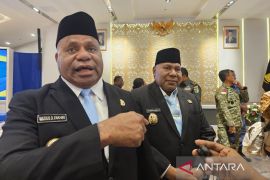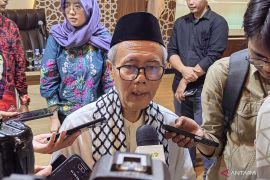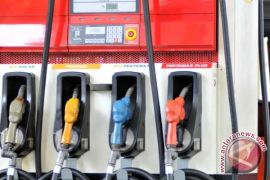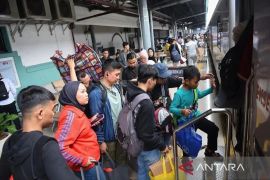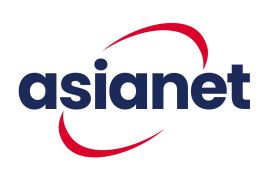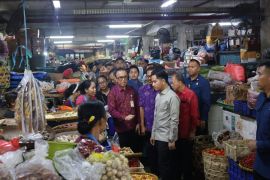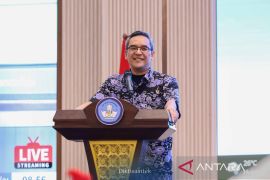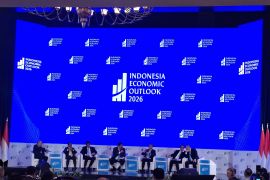"Programs are on track means that targets are about to be achieved or have been exceeded," Minister Brojonegoro stated.Jakarta (ANTARA News) - In a bid to advance the country, the government is laying down its development programs on a Medium-Term National Development Plan (RPJMN) and long-term initiative called "Indonesia 2045 Vision."
The development carried out since the government of President Joko Widodo (Jokowi) came to power in late 2014 is believed to be running on the right track, National Development Planning Minister/Head of the National Development Planning Board (Bappenas) Bambang Brodjonegoro had stated in Jakarta on Tuesday, May 30.
The Bappenas minister said most of the programs in the RPJMN are on the right track. He made the statement after a meeting to discuss the implementation of the RPJMN 2015-2019 and to deliberate on the draft of the "Indonesia 2045 Vision" Long-Term Development Plan.
President Jokowi held a limited cabinet meeting to discuss the draft of the Indonesia 2045 Vision and to evaluate the implementation of the RPJMN 2015-2019 at his Presidential office late last month.
Three stages of national development will be needed to realize the Indonesia 2045 Vision. The implementation of the three stages of development will be carried out in three 10-year periods that will cover the development of infrastructure, processing industry to increase added value, and the service industry, including the tourism sector.
Hence, the president met his cabinet ministers to discuss the draft of the Indonesia 2045 Vision while evaluating the ongoing national development based on the RPJMN 2015-2019.
Jokowi chaired the limited cabinet ministers meeting to discuss two topics, notably the 2017 Revised State Budget and the Indonesia 2045 vision.
On the previous day, President Jokowi had held a plenary cabinet meeting at the Presidential Palace in Bogor, West Java, to discuss preparations in the face of the Muslim post-fasting Eid ul-Fitr or Lebaran festivities.
Regarding the evaluation of the RPJMN 2015-2019, Minister Brodjonegoro said the development programs have been carried out based on plans.
"We divided the results of the evaluation into three parts. One part likely is very difficult to achieve, and the other part still needs additional efforts to realize it. However, most of the programs are already on the right course. The one that is difficult to achieve is only small, yet we need additional efforts to achieve it," Brodjonegoro noted.
Moreover, there are programs that have been realized but are showing indications of being wrongly prepared since the start, both in terms of target and definition. Yet, in general, the national development programs have been carried out on the right track. The government, however, has to work hard, so that the national development programs for the 2015-2019 period would be carried out holistically and smoothly.
"Programs are on track means that targets are about to be achieved or have been exceeded," Minister Brojonegoro stated, adding that based on data, the number of programs that had been on the right track is the largest one.
However, some data of the programs that have been achieved would be eliminated, as since the start, their planning has been viewed to have been wrongly made. The minister cited the tax ratio as an example.
"The 16 percent tax ratio is difficult to achieve since now, the realization of the tax ratio is only 11 percent. The poverty indicator is still in the yellow mark, so we need to put in extra efforts to achieve the target by 2019," he noted.
The additional efforts to be made by the government are included in the Government Work Plan for 2018 and 2019. Programs considered to have been on the right track included those related to infrastructure development and efforts to control inflation.
Infrastructure development is one of the programs that can be realized and is being given priority by the government. It is included in the first three 10-year periods of the Indonesia 2024 Vision.
Infrastructure development, to serve as the foundation for other developmental stages, will be carried out in the first 10 years.
According to President Jokowi, the government will first build infrastructure as the foundation for development. This is considered to be important. Infrastructure development is a program on which the government will rely on to boost the countrys competitive power.
Several development projects are currently being carried out by the government, including those in the areas of electricity infrastructure, toll roads, airports, and also seaports, which are being accelerated.
Seaport development projects are being implemented at three locations of Kuala Tanjung, Makassar New Port, and Tanjung Priok, and this year, the government will start the development of a port in Sorong, Papua. In their absence, it would be impossible for Indonesia to become competitive in the current era of free trade, which Indonesia can no longer avoid.
"We must really focus and complete this first stage of infrastructure development in order to strengthen our competitiveness. The cost of logistics and transportation will be much cheaper and will make the prices of goods competitive as compared to those from abroad," he noted.
The projects are also expected to help develop human resources. From 2030 to 2035, Indonesia will enjoy a demographic bonus in which the country will be supported by 52 percent of its population belonging to the productive age group.
This is what Indonesia must be able to benefit from in order to compete with other countries.
The development of human resources will lead to the creation of a strong workforce. However, if it fails, it would create a huge burden on the country. Hence, the government has reminded anyone who will lead the country in future that the development of human resources will be the key to taking Indonesia into the Golden Age in 2045.
The second stage will cover the development of the processing industry to increase the added value of its products.
"During this period, raw materials must no longer be sold before they are processed, at least into semi-finished products. We must no longer export crude palm oil. Derivative products must be produced whether in the form of cooking oil, cosmetics, or others," Jokowi noted.
The government must no longer export it in the form of raw materials. This also applies to corn. It must not be exported in raw form. All types of foods, including animal feed, must pass through the processing industries," he explained.
The last stage will encompass the development of the service industry, including the tourism sector. "Our strength is actually the tourism industry. Younger generations must join the sector, which is very promising. We are now developing 10 new tourist destinations. Go there," the president stated.(*)
Reporter: Andi Abdussalam
Editor: Heru Purwanto
Copyright © ANTARA 2017
